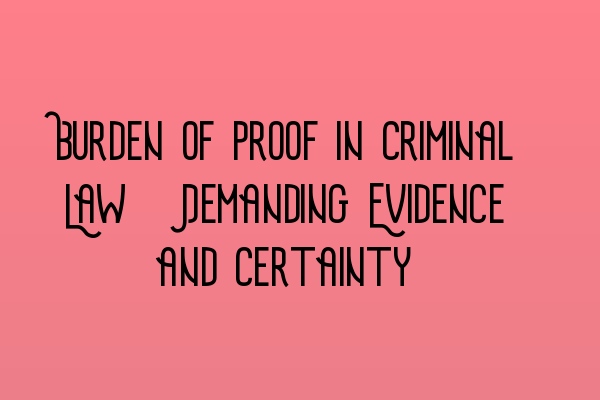SQE Criminal Law & Practice Law UK
The Burden of Proof in Criminal Law: Demanding Evidence and Certainty
In the criminal justice system, the presumption of innocence is a fundamental principle. It places the burden of
proof on the prosecution to establish the guilt of the accused beyond a reasonable doubt. This means that the
prosecution must present compelling evidence to convince the court of the accused’s guilt. The burden of proof is
a crucial aspect of criminal law, and understanding its implications is essential for legal professionals.
The burden of proof is often described as the obligation to prove the case beyond a reasonable doubt. The
prosecution, as the party responsible for proving guilt, must provide sufficient evidence to convince the court and
the jury of the accused’s guilt. This evidence must be credible, reliable, and relevant to the charges brought
against the accused.
It is important to note that the burden of proof never shifts to the defendant. The defendant is not required to
prove their innocence, as they are already presumed innocent until proven guilty. The burden always remains on the
prosecution to demonstrate guilt beyond a reasonable doubt.
The standard of proof in criminal cases is set at a high threshold: beyond a reasonable doubt. This means that
the evidence presented must leave no reasonable doubt in the minds of the judge and jury. It is not necessary for
the evidence to establish absolute certainty, but it must be sufficiently convincing to exclude any reasonable
doubt about the accused’s guilt.
The demand for evidence and certainty is crucial in criminal law to protect individuals from wrongful convictions.
It ensures that a person’s liberty is not taken away without substantial and convincing evidence supporting the
accusation. The burden of proof ensures that the accused receives a fair trial and that the legal system operates
with integrity and justice.
To prepare for the SQE Criminal Law & Practice Law exams, it is important to have a solid understanding of the
burden of proof and its implications. There are various resources available to help you practice and enhance your
knowledge. You can take advantage of SQE 1 Practice Exam Questions or SQE 1 Practice Mocks FLK1 FLK2 to test your
understanding of key concepts. Additionally, SQE 2 Preparation Courses and SQE 1 Preparation Courses can provide
comprehensive guidance for exam readiness.
Stay informed about the latest SRA SQE Exam Dates to ensure you plan your studies effectively and stay on track
towards achieving success in your exams.
